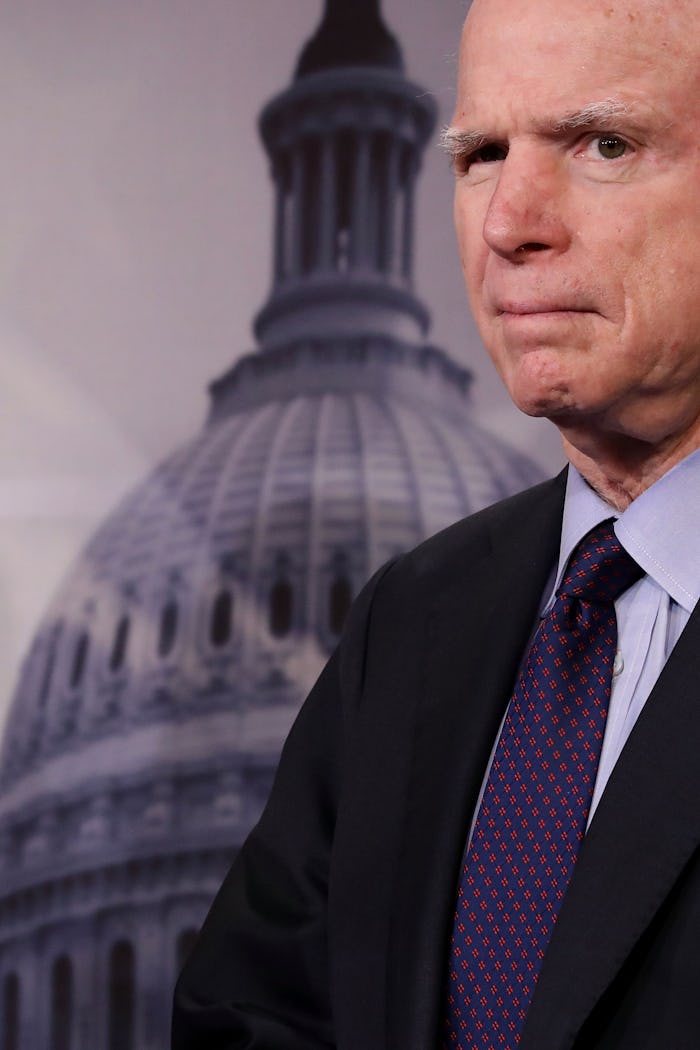News

John McCain's Russian Hacking Comments Paint A Dark Picture Of The Future
Leaders from both parties in the upper echelons of government agree that the CIA and FBI's finding that Russians conducted cyberattacks to sway the the election in Donald Trump's favor is a grave threat to our democracy, even if the president-elect himself is dismissive of the conclusion. A bipartisan band of senators is seeking to create a select committee specifically to further investigate this audacious act of espionage, and one of them, Arizona Sen. John McCain, described the situation on Sunday in the bluntest and most ominous of terms: "the sign of a possible unraveling of the world order." In fact, John McCain's Russian hacking comments further reveal his intense criticism of both President Obama's "paralyzed" response to this major security threat, as well as construct a near-dystopian outlook of the future.
In an interview with Jake Tapper on CNN's State of the Union, the chair of the Senate Armed Forces Committee slammed Obama for having "no strategy and no policy as to what to do about these various cyberattacks" in stressing his insistence that Congress vigorously investigate Russia's cyberattacks, which the U.S. intelligence officials believe involved the country's president, Vladimir Putin, himself. So far high-ranking Republicans Senate Majority Leader Mitch McConnell and House Speaker Paul Ryan have rebuffed the calls for an expanded congressional probe, according to The Washington Post — although they, unlike Trump (who labeled the CIA's claims "ridiculous"), do disavow the foreign interference. McConnell has warned against turning it into a "partisan issue."
The Obama administration, for its part, appears to agree somewhat about the danger of allowing foreign actors any extra ammunition in meddling in the United States' politics. On Friday, NBC News reported that the White House did not react more vigorously to Russians hacking (which included leaks of incriminating Democratic National Committee emails as well as the publishing via WikiLeaks of the emails of Hillary Clinton's campaign chair, John Podesta) because it did not want to be perceived as trying to influence public opinion in Clinton's favor. This, even though it announced Oct. 7 its belief that Russia was the culprit — all evidence, to McCain, that this country is in the midst of an "absolute failure of American leadership."
"When America doesn't lead, a lot of other bad people do," he told Tapper.
At a press conference Friday, Obama defended his lack of force or assertiveness. "There have been folks out there who suggest somehow if we went out there and made big announcements and thumped our chests about a bunch of stuff, that somehow it would potentially spook the Russians," he said, according to The New York Times, noting too that he had implored Putin to "cut it out" and plans to continue sending the message that "we can do stuff to you." "I think it doesn’t read the thought process in Russia very well."
McCain's insistence that a more hardline response from Congress — such as expanding existing sanctions on the country — is in order precipitate potential discord among its members and the incoming president, whom many believe to be Putin's stooge. For example, Trump has nominated ExxonMobil CEO Rex Tillerson to be secretary of state, and the oil exec's track record, obvious Russia-entwined business entanglements, and close relationship with Putin himself indicate that he'll champion Putin-friendly handling of one of the United States' most formidable adversaries.
So, it would be in Russia's favor for Congress to conduct its investigations through existing Senate and House committees, as McConnell and Ryan prefer, according to CNN, from McCain's perspective:
The responsibilities for cyber is spread over about four different committees in the Senate, and each doing their own thing, frankly, is not going to be the most efficient way of arriving at a conclusion ... We need a select committee. We need to get to the bottom of this. We need to find out exactly what was done and what the implications of the attacks were, especially if they had an effect on our election.
If the Russian government truly did aim to facilitate the election of Donald Trump and wreak political havoc here, it was successful. Moving forward, our government must unite against this threat, rising above partisanship to confront Putin and his hackers. Sen. John McCain believes the first step to accomplishing that is getting all the information possible and establishing strong leadership willing to stand up to Russia. The question becomes whether Trump is up to the task.